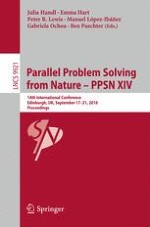2016 | OriginalPaper | Buchkapitel
iMOACO\(_\mathbb {R}\): A New Indicator-Based Multi-objective Ant Colony Optimization Algorithm for Continuous Search Spaces
verfasst von : Jesús Guillermo Falcón-Cardona, Carlos A. Coello Coello
Erschienen in: Parallel Problem Solving from Nature – PPSN XIV
Aktivieren Sie unsere intelligente Suche, um passende Fachinhalte oder Patente zu finden.
Wählen Sie Textabschnitte aus um mit Künstlicher Intelligenz passenden Patente zu finden. powered by
Markieren Sie Textabschnitte, um KI-gestützt weitere passende Inhalte zu finden. powered by
